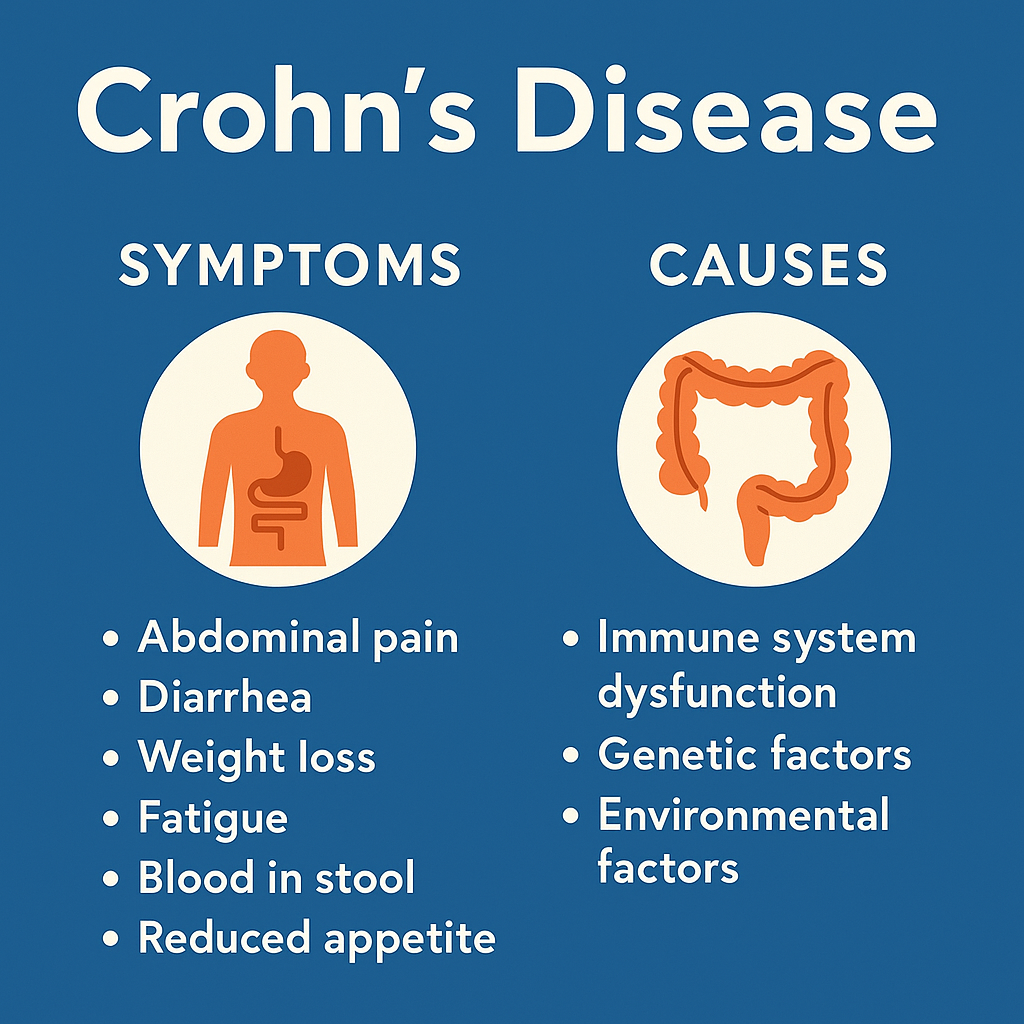Crohn’s disease is a type of chronic inflammatory bowel disease (IBD) that results in digestive disturbances, exhaustion, and discomfort in the abdomen due to inflammation in the digestive tract. The small intestine and colon are where it is most frequently found, but it can affect any part of the gastrointestinal tract, from the mouth to the anus. Timely diagnosis, successful treatment, and long-term management of Crohn’s disease depend on an understanding of the disease’s early symptoms and underlying causes.

What is Crohn’s Disease?
Being an autoimmune disease, Crohn’s disease occurs when your body’s immune system unintentionally targets healthy tissues. This attack causes intestinal wall thickening, ulcers, and inflammation in Crohn’s disease. Because Crohn’s disease is chronic and prone to unpredictable flare-ups, unlike some digestive disorders, patients should receive continuous support from a gastroenterology specialist.
Common Symptoms of Crohn’s Disease
Symptoms can vary in intensity from person to person and may develop gradually or appear suddenly. Below are the most frequently reported signs:
Abdominal Pain and Cramping
One of the most prevalent symptoms is severe or ongoing pain, usually in the lower right abdomen. Inflammation or intestinal constriction are typically associated with pain.
Diarrhea
Patients with Crohn’s disease often have chronic diarrhea, occasionally with urgency and incontinence. Normal fluid absorption may be interfered with by intestinal inflammation.
Fatigue
Even when you’re getting enough sleep, persistent inflammation, poor nutrient absorption, and sleep disturbances can cause crippling fatigue.
Weight Loss
Reduced appetite, nutrient malabsorption, and a fear of eating because of stomach pain can all lead to unintended weight loss
Blood in Stool
In more severe cases, Crohn’s disease can result in blood in the stool or rectal bleeding, particularly if the colon is inflamed or has ulcers.
Fever
A low-grade fever could be a sign of an underlying infection or an inflammatory flare.
Mouth Sores and Skin Issues
Some patients develop ulcers in the mouth, skin rashes, or eye inflammation as part of an immune system reaction.
What Causes Crohn’s Disease?
While the exact cause is still unclear, several factors are believed to contribute to the development of Crohn’s disease:
Immune System Dysfunction
Abnormal immune responses can lead the body to attack its own gut lining, mistaking beneficial bacteria or food as threats.
Genetics
Having a family history of IBD significantly increases the likelihood of developing Crohn’s. Certain genes are linked to the disease’s occurrence.
Environmental Factors
Smoking, a diet high in processed foods, antibiotic use, and stress may trigger or worsen symptoms, especially in genetically predisposed individuals.
Gut Microbiome Imbalance
An imbalance in the gut’s natural bacteria (dysbiosis) can contribute to inflammation and immune overactivity.
When to See a Doctor
It’s critical to pay attention to persistent or inexplicable gastrointestinal symptoms. A gastroenterologist should be consulted for persistent or worsening digestive problems, even though they may not be serious at first.
You should schedule an appointment if you experience:
- Ongoing abdominal pain or cramping
- Frequent diarrhea that doesn’t improve
- Unintentional weight loss
- Blood in your stool
- Chronic fatigue or weakness
- Fever lasting more than a couple of days
- A family history of inflammatory bowel disease (IBD)
Who Is at Risk?
- People who are 15 to 35 years old
- Individuals with a family history of autoimmune diseases, such as Crohn’s
- Smokers (using tobacco exacerbates the illness and impacts the effectiveness of treatment)
- People who reside in urban or industrialized areas (perhaps as a result of pollution or diet)
Diagnosis and Treatment at Colon & Digestive Health Specialists
Early diagnosis and management are key to living well with Crohn’s. Under the direction of Dr. Karim Shakoor, our skilled staff at Colon & Digestive Health Specialists , provides individualized assessments utilizing cutting-edge diagnostic instruments such as:
- Stool and blood tests
- Imaging studies (CT enterography, MRI)
Treatment Options May Include:
- Anti-inflammatory drugs (e.g., corticosteroids, aminosalicylates)
- Immune system suppressors
- Biologic therapies (targeted treatments for inflammation)
- Nutritional support and lifestyle guidance
- Surgical intervention for severe complications
Final Thoughts
Crohn’s disease may be chronic, but it’s manageable with the right medical care and lifestyle adjustments. If you’re experiencing persistent digestive symptoms, don’t wait for them to worsen.
For a professional diagnosis and individualized treatment, get in touch with Colon & Digestive Health Specialists right now.
Crohn’s disease is a chronic inflammatory condition of the gastrointestinal tract that can cause severe digestive symptoms and complications.
Common symptoms include persistent diarrhea, abdominal pain, fatigue, weige.ht loss, and reduced Appetit
Crohn’s disease may be caused by an immune system malfunction, genetic factors, environmental triggers, and gut microbiota imbalances.
While Crohn’s disease has no known cure, its symptoms can be effectively managed with medications, dietary changes, and sometimes surgery.
